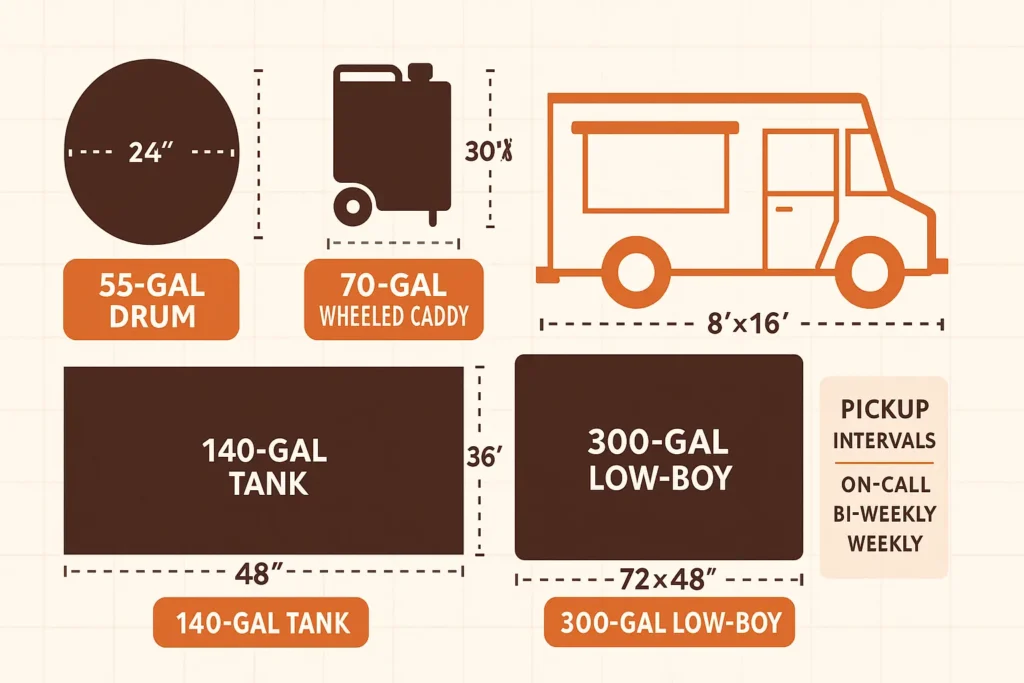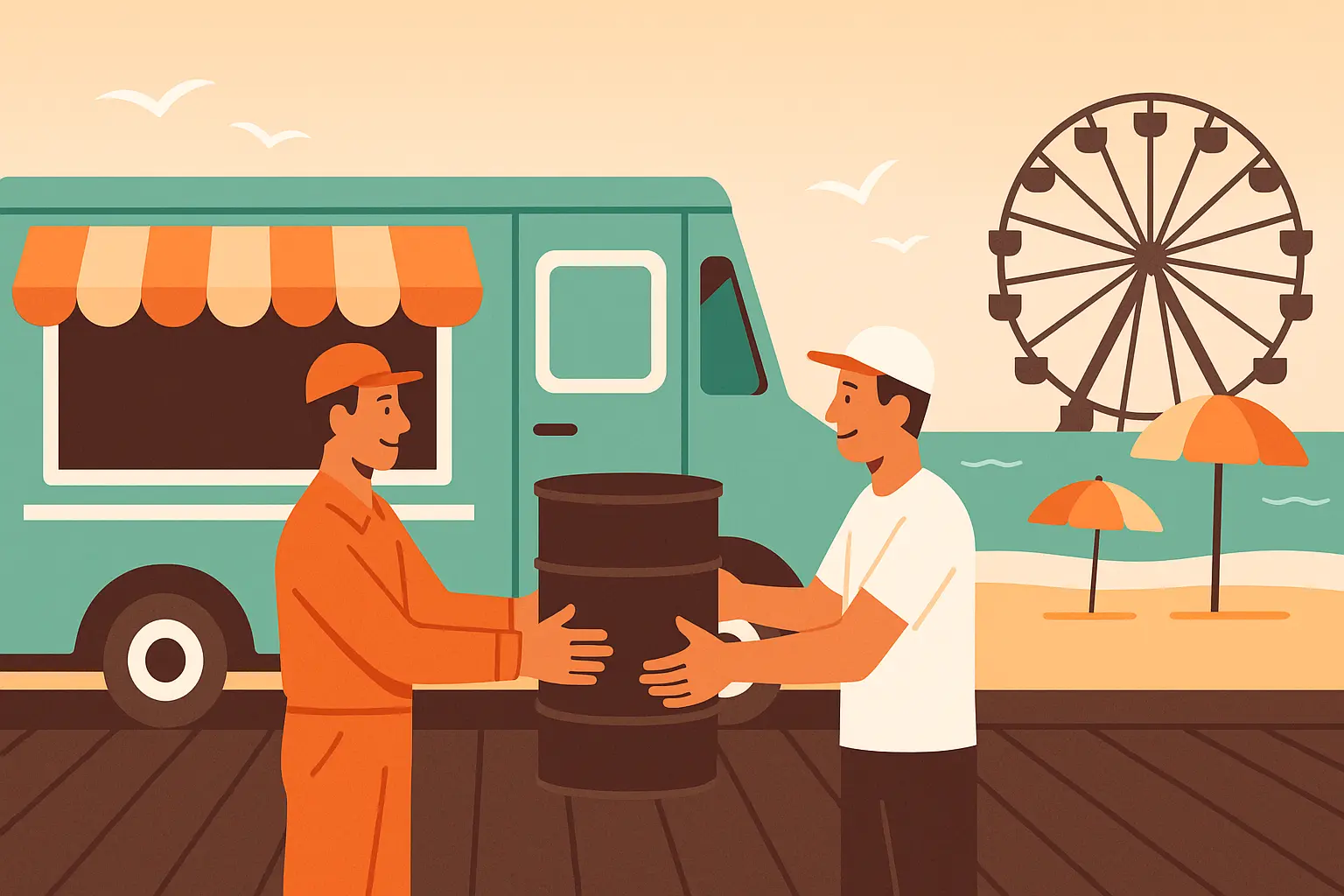Table of Contents
Why A Grease Plan Matters Before You Hit The Shore
A single basket of fries leaves a slick of spent oil that New Jersey labels “food waste” and regulates alongside fats, oils, and grease (FOG). Spills on a dune or boardwalk can trigger local fines of $1,000 or more under city FOG ordinances. Even pop up trucks must log disposal volumes and keep receipts, because inspectors can ask for records at any stop. A documented plan container, pickup schedule, and commissary fallback turns those rules into routine, protects your brand, and keeps rebate cash flowing.
NJ Health & Environmental Rules Plain English Snapshot
Mobile kitchens fall under N.J.A.C. 8:24 (Sanitary Code) and must dispose of FOG “through an approved system.” The DEP’s food waste law adds recycling mandates once totals top 52 tons a year about 275 gal/week of fryer oil. Local fire officials also require hood suppression tags current within six months when grease laden vapors are produced. In practice, inspectors ask three things: Where’s your container? Who pumps it? Where are the tickets? Have those answers ready in printed or digital form.
Commissary & FOG Interceptor Basics for Mobile Kitchens
New Jersey trucks must list a licensed commissary on permit apps so cleaning and oil transfer can occur off site when events ban pump trucks. Many shore towns demand proof the commissary has a grease interceptor sized per local code 1 lb of grease per 1.5 GPM flow in Jersey City, for example. Keep a signed letter from the commissary manager plus quarterly pump out slips; they satisfy both health and fire inspectors at pop ups.
Pick the Right Grease Container for Trailers
| Fryer Oil Output (gal/week) | Recommended Container | Typical Footprint | Pickup Interval |
|---|---|---|---|
| ≤ 20 | 55 gal drum with lock ring | 24″ Ø | On call |
| 21 to 60 | 70 gal wheeled caddy | 30″ × 30″ | Bi weekly |
| 61 to 120 | 140 gal steel tank w/ lid | 48″ × 36″ | Weekly |
| 120 + | 300 gal low boy on casters | 72″ × 48″ | Twice/week |
Grease containers must close tight; East Rutherford fire rules reject any vessel that can tip or splatter. Grease Connections delivers the size you pick within 48 hours anywhere from Cape May to Hoboken and swaps it if your volume jumps.

How On Site Pump Service Trucks Work
Pump trucks carry heated hoses that vacuum 600 gal in under ten minutes, preventing hand pour spills. Drivers scan your container barcode, weigh the load, and email a DEP accepted manifest before they leave, which satisfies the “generator responsibility” clause in NJ used oil regulations. Miss a scheduled stop? Grease Connections’ 15 minute punctuality credit means we will add a few extra cents to your rebate, so busy boardwalk lines stay moving.
Temporary Events & Boardwalk Festivals Weekend Speed Compliance
Ocean County’s 2024 temp event packet asks every vendor to show a disposal plan at least five days before the fair opens. Seaside Heights bans any waste transfer directly on the public beach or boardwalk; you must wheel the oil to a service road or commissary zone 250 ft away. The Division of Fire Safety requires a separate one day cooking vendor permit issued online via RIMS for each festival. Booking a Sunday pump out with a DEP licensed hauler satisfies all three rules in one step.
Festival Day Workflow From Hot Fryer to Safe Recycling
- Cool & Cap: Drop fryer temp to 120 °F, then drain into a stainless stock pot with lid. Cooling prevents flash steam when you pour.
- Wheel & Seal: Move oil to the caddy, lock the lid, and snap the tamper tag supplied by the hauler.
- Scan & Pump: Driver scans the tag, vacuums, and uploads the manifest creating the record inspectors want.
The whole loop clocks under 15 minutes, so you reopen before the lunch rush.
Jersey Shore City Snapshot Service Links for Fast Permitting
Grease Connections maintains same day pickup teams in city + fryer oil recycling hubs like Asbury Park fryer oil recycling and Atlantic City fryer oil recycling.
Where Your Oil Goes The Circular Shore Economy
After pickup, oil is filtered, tested for water, and shipped to certified biodiesel plants diverting FOG from sewers and offsetting diesel emissions. DEP’s food waste law counts this recycling toward any municipal diversion targets, so towns welcome compliant vendors. That eco story also boosts festival bids; organizers love showcasing closed loop stats in their sustainability reports.
Quick Answer FAQ
- Do I need a grease trap inside the truck? No, NJ focuses on exterior storage and proper disposal manifests for mobile units.
- Can I pour small amounts down the commissary sink? Only if the sink feeds a code sized interceptor and you log each gallon.
- What if my event blocks pump trucks? Schedule an early morning pull or use the commissary container; inspectors accept either with paperwork.
Next Step
Grease Connections advises every seasonal truck to book a free container survey and receive a written oil disposal plan before filing any 2025 event permits.









